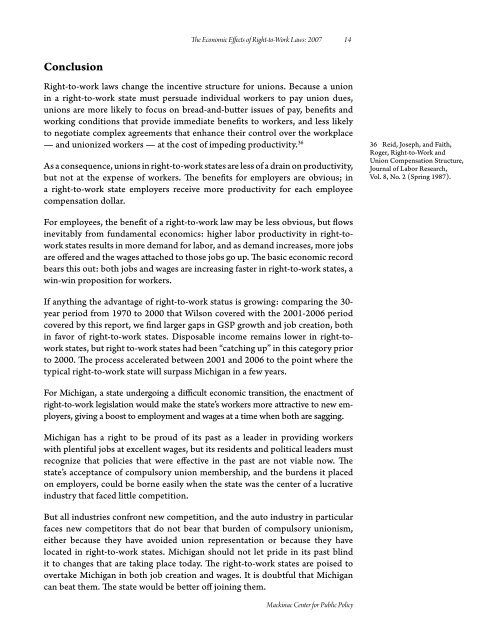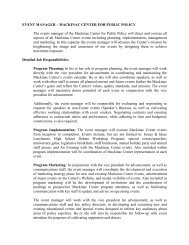The economic effecTs of RighT-To-WoRK LaWs ... - Mackinac Center
The economic effecTs of RighT-To-WoRK LaWs ... - Mackinac Center
The economic effecTs of RighT-To-WoRK LaWs ... - Mackinac Center
You also want an ePaper? Increase the reach of your titles
YUMPU automatically turns print PDFs into web optimized ePapers that Google loves.
<strong>The</strong> Economic Effects <strong>of</strong> Right-to-Work Laws: 2007 14<br />
Conclusion<br />
Right-to-work laws change the incentive structure for unions. Because a union<br />
in a right-to-work state must persuade individual workers to pay union dues,<br />
unions are more likely to focus on bread-and-butter issues <strong>of</strong> pay, benefits and<br />
working conditions that provide immediate benefits to workers, and less likely<br />
to negotiate complex agreements that enhance their control over the workplace<br />
— and unionized workers — at the cost <strong>of</strong> impeding productivity. 36<br />
As a consequence, unions in right-to-work states are less <strong>of</strong> a drain on productivity,<br />
but not at the expense <strong>of</strong> workers. <strong>The</strong> benefits for employers are obvious; in<br />
a right-to-work state employers receive more productivity for each employee<br />
compensation dollar.<br />
36 Reid, Joseph, and Faith,<br />
Roger, Right-to-Work and<br />
Union Compensation Structure,<br />
Journal <strong>of</strong> Labor Research,<br />
Vol. 8, No. 2 (Spring 1987).<br />
For employees, the benefit <strong>of</strong> a right-to-work law may be less obvious, but flows<br />
inevitably from fundamental <strong>economic</strong>s: higher labor productivity in right-towork<br />
states results in more demand for labor, and as demand increases, more jobs<br />
are <strong>of</strong>fered and the wages attached to those jobs go up. <strong>The</strong> basic <strong>economic</strong> record<br />
bears this out: both jobs and wages are increasing faster in right-to-work states, a<br />
win-win proposition for workers.<br />
If anything the advantage <strong>of</strong> right-to-work status is growing: comparing the 30-<br />
year period from 1970 to 2000 that Wilson covered with the 2001-2006 period<br />
covered by this report, we find larger gaps in GSP growth and job creation, both<br />
in favor <strong>of</strong> right-to-work states. Disposable income remains lower in right-towork<br />
states, but right to-work states had been “catching up” in this category prior<br />
to 2000. <strong>The</strong> process accelerated between 2001 and 2006 to the point where the<br />
typical right-to-work state will surpass Michigan in a few years.<br />
For Michigan, a state undergoing a difficult <strong>economic</strong> transition, the enactment <strong>of</strong><br />
right-to-work legislation would make the state’s workers more attractive to new employers,<br />
giving a boost to employment and wages at a time when both are sagging.<br />
Michigan has a right to be proud <strong>of</strong> its past as a leader in providing workers<br />
with plentiful jobs at excellent wages, but its residents and political leaders must<br />
recognize that policies that were effective in the past are not viable now. <strong>The</strong><br />
state’s acceptance <strong>of</strong> compulsory union membership, and the burdens it placed<br />
on employers, could be borne easily when the state was the center <strong>of</strong> a lucrative<br />
industry that faced little competition.<br />
But all industries confront new competition, and the auto industry in particular<br />
faces new competitors that do not bear that burden <strong>of</strong> compulsory unionism,<br />
either because they have avoided union representation or because they have<br />
located in right-to-work states. Michigan should not let pride in its past blind<br />
it to changes that are taking place today. <strong>The</strong> right-to-work states are poised to<br />
overtake Michigan in both job creation and wages. It is doubtful that Michigan<br />
can beat them. <strong>The</strong> state would be better <strong>of</strong>f joining them.<br />
<strong>Mackinac</strong> <strong>Center</strong> for Public Policy







